Table of Contents
Get started with MyPerfectResume today!
- Build a resume on any device
- Pick an ATS-friendly template
- Tailor with AI copy suggestions
Why this resume works
- Quantifies accomplishments: By highlighting measurable accomplishments like a 25% increase in vendor engagement, the applicant showcases tangible results that emphasize their effectiveness and value.
- Uses action-oriented language: Using action verbs such as “managed” and “coordinated,” the applicant’s resume effectively communicates initiative and impact.
- Illustrates problem-solving ability: The applicant negotiated contracts to save $50,000 annually, demonstrating their problem-solving skills and innovative thinking.
More Event Manager Resume Examples
Review more event manager resume examples to see how to showcase your organizational skills, leadership abilities, and successful event coordination. These event planning resume samples provide a solid foundation for creating a resume that positions you as a top applicant in event management roles.
Entry-Level Event Manager
Why this resume works
- Puts skills at the forefront: By using a skills-based resume format, the applicant effectively highlights event planning and budget management skills, ideal for showcasing expertise to potential employers.
- Effective use of keywords: Strategically embedding terms like “vendor coordination” and “event planning” ensures that this resume aligns with keywords important for passing applicant tracking systems (ATS).
- Shows digital literacy: The applicant’s adept use of platforms to boost social media marketing shows computer skills and digital readiness for modern workplaces.
Mid-Level Event Manager
Why this resume works
- Includes a mix of soft and hard skills: The applicant effectively merges event planning with interpersonal skills, showcasing an ability to lead, collaborate, and create memorable experiences for diverse clients.
- Demonstrates language abilities: Language skills in Spanish, French, and German indicate the applicant’s ability to support seamless communication during international events and foster strong cross-cultural connections.
- Displays technical expertise: Certified Meeting Professional credentials highlight the applicant’s technical prowess, ensuring precise execution of complex event logistics and innovative solutions tailored to client needs.
Experienced Event Manager
Why this resume works
- Focuses on work history: Using a chronological resume format, the applicant shows extensive experience by detailing progressive roles from events assistant to event manager, improving credibility.
- Emphasizes leadership skills: Leading over 100 events annually and launching initiatives like resource-saving projects showcases the applicant’s leadership skills in driving successful outcomes.
- Lists relevant certifications: Listing certifications, such as Certified Special Events Professional, reinforces expertise and dedication to staying updated in event management.
Event Manager Resume Template (Text Version)
Jin Patel
Oakridge, OR 97471
(555)555-5555
Jin.Patel@example.com
Professional Summary
Seasoned Event Manager with 6 years of experience in high-impact events. Proven track record in managing large-scale events, optimizing budgets, and boosting attendee engagement. Skilled in vendor negotiation and team leadership, seeking to leverage expertise in a dynamic environment.
Work History
Event Manager
Prestige Event Solutions – Oakridge, OR
January 2023 – July 2025
- Managed events with over 1,000 attendees
- Increased vendor engagement by 25%
- Reduced event cost by 15%
Conference Coordinator
Visionary Conferences Inc. – Oakridge, OR
January 2020 – December 2022
- Coordinated logistics for executive summits
- Boosted attendee satisfaction scores by 20%
- Negotiated contracts saving ,000 annually
Event Planner
Grand Celebrations – Portland, OR
January 2017 – December 2019
- Organized weddings and corporate events
- Improved feedback scores by 18%
- Managed event teams of up to 20 staff
Languages
- Spanish – Beginner (A1)
- French – Beginner (A1)
- German – Beginner (A1)
Skills
- Event Planning
- Budget Management
- Vendor Negotiation
- Team Leadership
- Project Coordination
- Risk Management
- Client Relations
- Marketing Strategy
Certifications
- Certified Meeting Professional – Events Industry Council
- Event Planning Certificate – The Event School London
Education
Master of Business Administration Business Management
University of California, Berkeley Berkeley, CA
May 2017
Bachelor of Arts Communications
University of Oregon Eugene, OR
May 2015
Related Resume Guides
Advice for Writing Your Event Manager Resume
Explore our advice on how to write a resume for an event manager position and discover how to highlight your knack for planning and executing unforgettable events. From showcasing your organizational skills to emphasizing your creative flair, we’ve got tips tailored just for you.
Showcase your portfolio or projects
For an event manager, showing off your portfolio or projects on your resume is an excellent way to highlight your skills and creativity. Your portfolio lets potential employers see the events you’ve planned, how you tackled different challenges, and the unique touches you bring to each project.
Whether it’s a corporate conference, wedding, or community festival, every event you manage adds to your experience and story. Linking to an online portfolio like Behance or a personal website can give hiring managers direct access to your work and help set you apart from other candidates. Make sure your portfolio includes high-quality photos, event descriptions, client testimonials, and any measurable results.
Include select projects that best highlight your strengths as an event manager. Focus on events that demonstrate your planning abilities, creativity, and adaptability. Freelance work, academic projects, and side gigs are just as valuable as formal roles—they show the variety of events you’ve managed and your ability to succeed in different settings.
When adding projects to your resume, treat them like job entries: list the project name and the client or organization if applicable, provide a brief description of the event, and highlight your specific contributions along with any measurable results. This approach gives potential employers a clear picture of your experience and the impact of your work.
Example of a projects section
Annual Music Festival Coordination
Harmony Events
June 2022
- Managed a team of 20 to organize a 3-day music festival attended by over 10,000 patrons.
- Coordinated with artists, vendors, and local authorities to ensure smooth event operations.
- Implemented digital ticketing solutions that decreased entry wait times by 30%.
Corporate Gala Dinner Planning
Elite Corp
October 2023
- Orchestrated a high-profile gala dinner for 500 corporate clients and stakeholders.
- Designed an engaging theme and entertainment lineup that received positive feedback from attendees.
- Negotiated contracts with caterers and suppliers, reducing costs by 15% while maintaining quality.
Need help writing your resume? Check out our professional resume examples to see how to effectively showcase your skills and experience to stand out to hiring managers.
Emphasize your most relevant skills
As an event manager, it’s important to highlight both technical and soft skills in your resume. Technical skills like using event management software, graphic design tools, or social media platforms can make your work more efficient and creative.
Soft skills such as communication, organization, and problem-solving are just as essential for coordinating with vendors, managing teams, and ensuring events run smoothly.
Including a dedicated skills section on your resume can help showcase these abilities. List specific software you are comfortable with and any artistic talents that improve your role. Additionally, weave these skills into your work experience bullet points.
For instance, instead of simply stating “organized events,” you could say “used event management software to organize successful corporate events.” This shows how you applied your skills in real situations, making a stronger impact on potential employers.
Highlight your experience—choose a resume format that showcases your skills in planning, coordinating, and managing events clearly and logically.
Choose a professional resume template
When choosing a resume template for an event manager role, aim for one that balances creativity with professionalism. While it’s tempting to select a flashy design to stand out, it’s more effective to choose a clean and structured layout.
Look for templates that use clear headings, bullet points, and plenty of white space. This helps your experience and skills shine without overwhelming visuals distracting from the content.
Select a format that’s ATS-friendly. Many companies use applicant tracking systems to filter resumes before they reach human eyes. To ensure your resume isn’t lost in the system, avoid overly complex designs or unusual fonts that may not be readable by these systems. A straightforward template with bold section titles and consistent formatting is often best.
Lastly, make sure the visual hierarchy is easy to follow. Important sections like work experience and skills should naturally draw the eye, helping recruiters quickly find key information about your abilities as an event manager. Keep it simple yet impactful to leave a positive impression.
You can use our Resume Builder to create your event manager resume. It helps you organize your experience and skills easily while offering designs that make your achievements stand out.
Format your resume properly
Proper resume format is essential for readability and creating a strong impression. If you’re an event manager, a chronological resume works well to showcase your previous roles in reverse order, emphasizing your career progression and skills in event planning. Use clear headings and bullet points to make accomplishments stand out.
5 resume formatting tips
- Use clear section headings: Structure your resume with distinct headings like “Work Experience” and “Skills.”
- Select consistent fonts: Choose a font that is easy to read, such as Arial or Calibri.
- Incorporate bullet points: Use bullet points for job duties and skills to improve scanning.
- Aim for a one-page length: Keep your resume to one page unless you have extensive experience.
- Ensure proper spacing and alignment: Maintain even margins and space between sections for a clean look.
Want to boost your resume’s chance of getting noticed? Our ATS Resume Checker reviews important details and helps you improve your score quickly.
FAQ
Do I need to include a cover letter with my event manager resume?
Adding a cover letter to your event manager resume can give you a valuable edge and help you stand out from other applicants.
It allows you to highlight specific events you’ve managed that align with the company’s focus, while demonstrating your expertise and enthusiasm for the role. A well-crafted cover letter also offers a chance to express your passion for event planning and showcase your strengths in areas like logistics, vendor coordination, or client relations.
To make the most impact, tailor your letter to reflect any experience you have with the types of events the company specializes in—whether that’s corporate conferences, community festivals, or large-scale productions.
Explore cover letter examples and use our Cover Letter Generator to make sure your cover letter effectively complements your resume and highlights your strengths as an event manager.
How long should an event manager’s resume be?
For an event manager, a one-page resume is often best to highlight your experience in planning and executing successful events. Focus on showcasing skills like project management, vendor coordination, and budget management through clear and concise bullet points.
If you have significant experience or certifications related to large-scale events, a two-page resume might work better. Ensure every detail counts by focusing on major accomplishments, leadership roles, and creative solutions you’ve introduced.
Check out our guide on how long a resume should be for tips tailored to choosing the right length for your career stage.
How do you write an event manager resume with no experience?
If you lack direct experience, tailor your event manager resume to highlight relevant skills, education, and any related experiences that showcase your potential. Here are a few tips on writing a resume with no experience to help you get started:
- Emphasize transferable skills: Highlight skills like organization, communication, and multitasking, which are important for event management. Mention experiences where you successfully organized or coordinated activities, even if they were informal or voluntary.
- Showcase volunteer work and internships: If you’ve volunteered at events or completed internships in related fields like marketing or hospitality, include these as practical experience. Detail your responsibilities and achievements during these roles to demonstrate your capability.
- Focus on education: List any degrees or courses in event management, hospitality, business administration, or related fields. Include relevant projects or group work where you played a key role in planning or organizing events.
Tailoring your resume to highlight these areas can effectively demonstrate your readiness for an event management position even without professional experience.
Rate this article
Event Manager
Share this page
Additional Resources
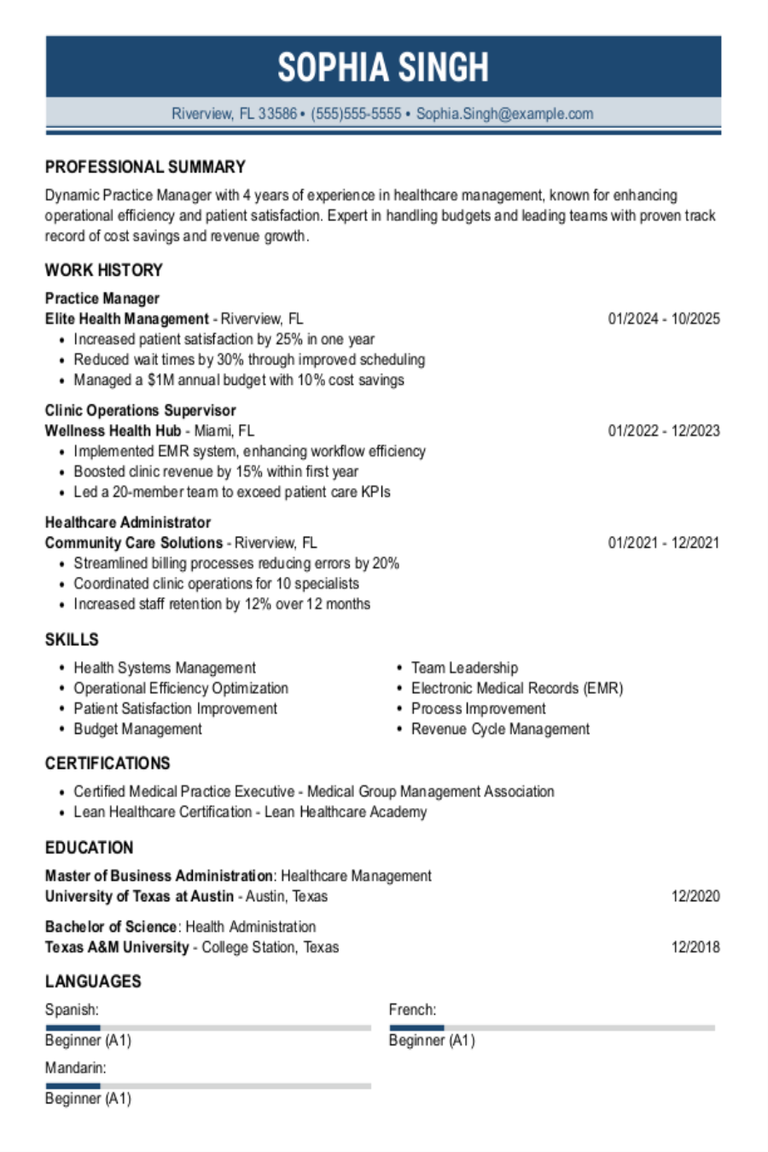
Practice Manager Resume Examples & Templates
Explore practice manager resume examples and tips to learn how to highlight your relevant skills and experience managing staff schedules and improving patient experiences.Build my resumeImport existing resumeCustomize this templateWhy

25 Interview Questions for Managers (With Answers & Tips)
Success in a management interview starts long before the conversation begins. Taking the time to prepare thoughtful responses to common interview questions for managers helps you clearly communicate leadership experience
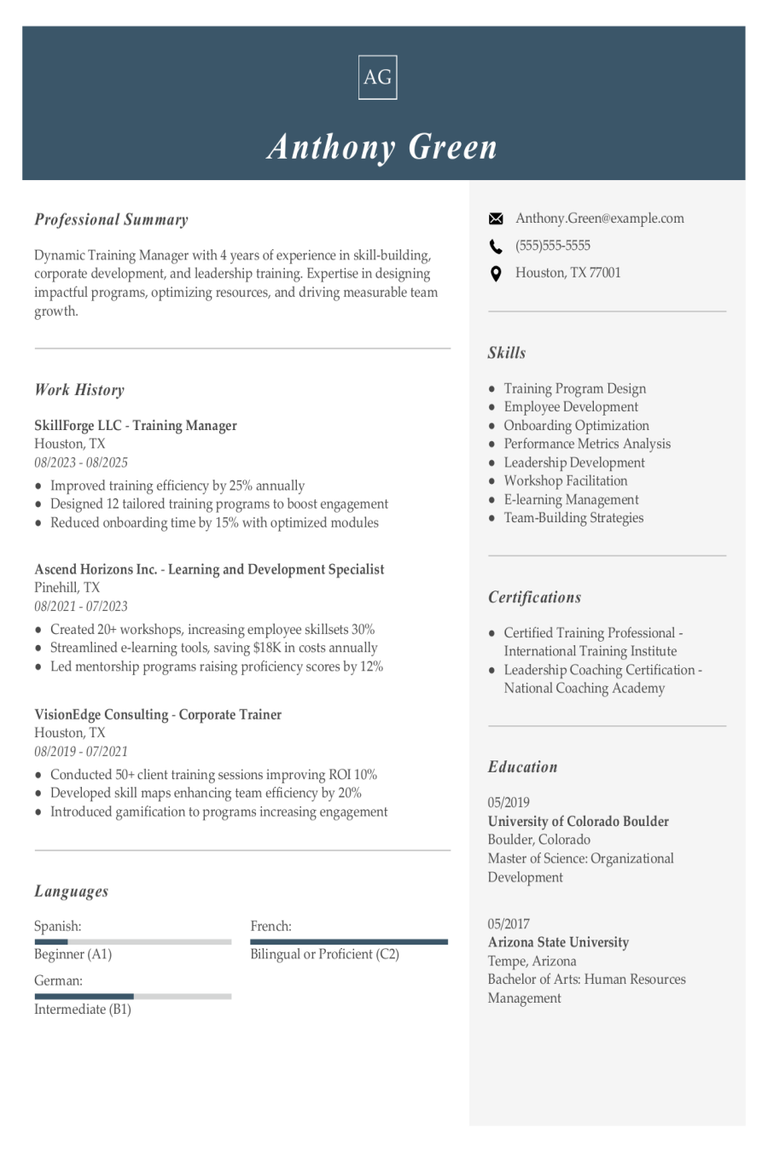
Training Manager Resume Examples & Templates
Discover how training managers showcase their skills in leading workshops and improving employee performance on their resumes. Our examples and tips will help you craft a resume that stands out
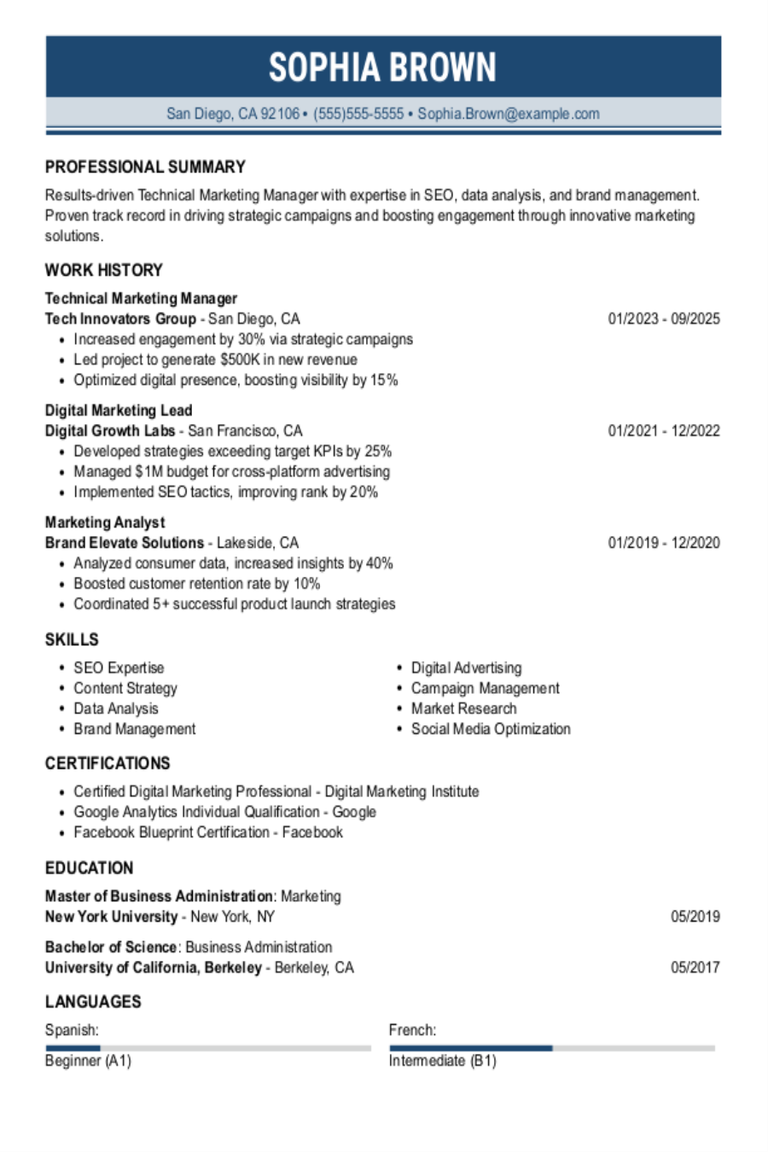
Technical Marketing Manager Resume Examples & Templates
Discover how to craft a technical marketing manager resume that shines. Learn to highlight your tech-savvy skills, marketing strategies, and project successes effectively.Build my resumeImport existing resumeCustomize this templateWhy this
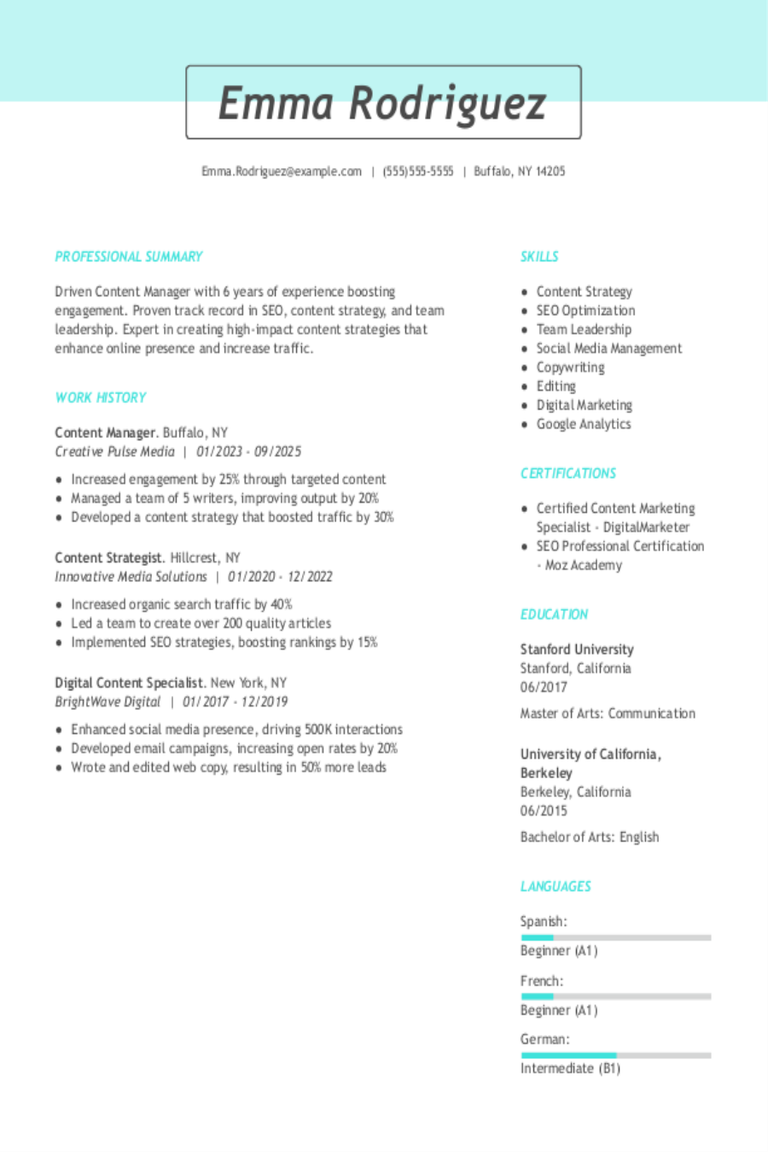
Content Manager Resume Examples & Templates
Browse content manager resume examples to see how to highlight your experience organizing, creating, and sharing engaging materials across platforms. These examples and tips help you showcase creativity, leadership, and
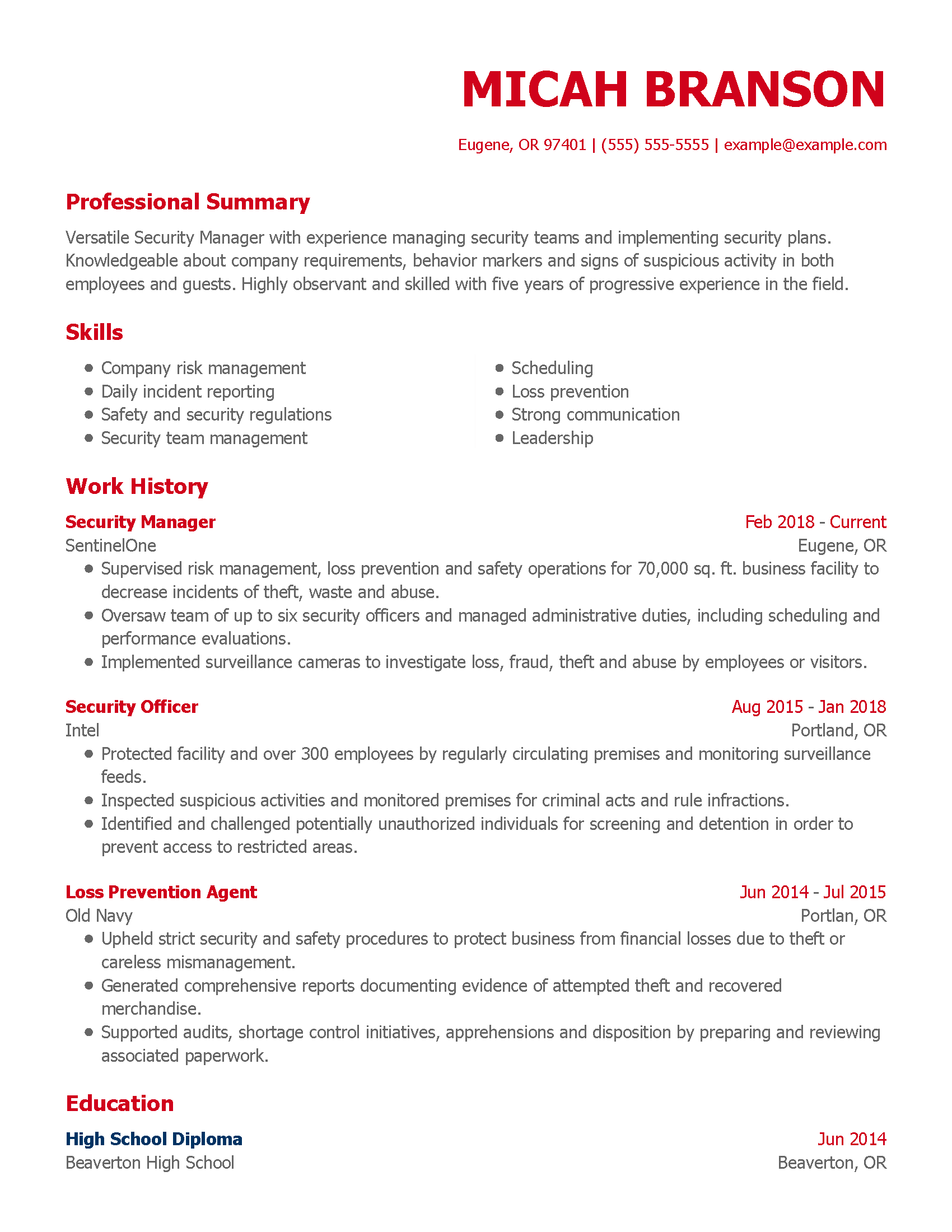
Security Manager Resume Examples & Templates
Explore security manager resume examples that showcase leadership, emergency response, and risk management. Get tips to highlight your skills and experience in keeping people and property safe.Build my resumeImport existing
